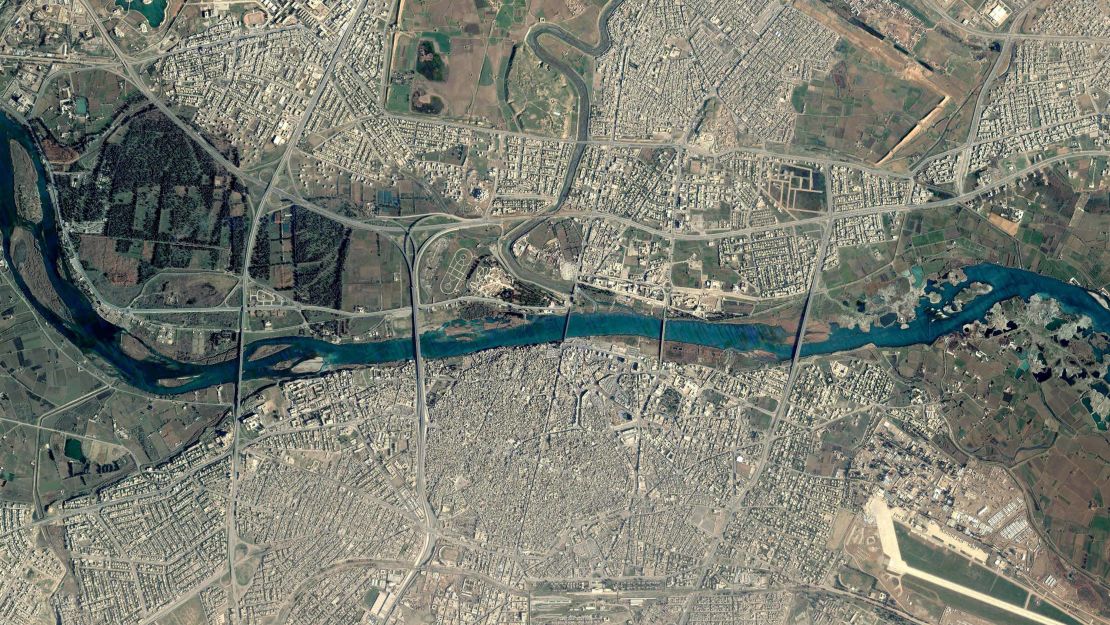Story highlights
NEW: Iraqi forces reclaim Albu Saif village, overlooking Mosul's airport
Western Mosul is ISIS' last major stronghold in Iraq
US-backed Iraqi forces have cleared ISIS fighters from a key village overlooking Mosul’s airport, the Iraqi army said Monday.
The seizure came less than 48 hours after the start of an operation to retake western Mosul – ISIS’ last major stronghold in the country.
Iraqi federal police and the Interior Ministry’s Rapid Deployment Force “seized complete control” of he village of Albu Saif, Gen. Abdal Amir Yar Allah said.
The village is perched on elevated ground and has strategic value in the push to take the airport, according to CNN’s Ben Wedeman.
“We’ve long been told by sources inside Mosul that ISIS has sabotaged the airstrip there to prevent its use,” Wedeman said.
“And just to the west of the airport is the Ghazlani army base, which has been used by ISIS in the past and is also one of the offensive’s objectives in the primary stages of the operation.”
The effort to take western Mosul, which began Sunday morning, comes weeks after Iraqi forces recaptured the eastern half of the city, which is divided by the Tigris River.
On the first day of the new offensive, Iraqi Federal Police forces said they killed 79 ISIS militants, destroyed weapons facilities and regained control of 10 villages.
The offensive is expected to come from south and west of the city. Iraqi forces will not be able to advance west across the river because all five bridges connecting the two halves of Mosul were destroyed by ISIS last month. They had previously been damaged by US-led airstrikes.

Iraqi Prime Minister Haider al-Abadi described the operation as a “new dawn” in the liberation of Mosul.
Western Mosul: The toughest battle yet
Mosul: Iraqi-led forces push into key city
ISIS seized Mosul in 2014. The offensive to retake Iraq’s second-largest city began in October with a push by the army, counter-terrorism forces, federal police and Kurdish Peshmerga fighters.
Iraqi commanders say the battle for western Mosul will be the toughest fight yet against ISIS. Over the past two years, the militant group has dedicated much of its defensive preparation to the western part of the city.
The city has networks of alleys that are impassable by military vehicles. And human rights organizations fear that the use of heavy weaponry in the narrow streets of the old city – where an estimated 650,000 civilians are still trapped – would probably result in very high human toll.
“When it comes to the old city, which is densely populated, people are very worried about residents being used as human shields,” said Belkis Wille, senior Iraq researcher for Human Rights Watch.
Food shortage
In addition to the risk of human casualties, Wille said it could take a long time for humanitarian aid to arrive.
“Cooking fuel, fuel for generators, basic food, clean water is almost non-existent,” she said.
“We’ve begun to hear reports of people dying of malnutrition. The question is how long will they have to wait before they can flee.”
Damian Rance, spokesman for the UN Office for the Coordination of Humanitarian Affairs, said while there are no confirmed cases of children dying from malnutrition, “many commodities are in short supply in western Mosul, including food, given that major commercial supply routes into the city have been cut since early November.”
US official: We won’t steal Iraq’s oil
As the effort to free western Mosul continues, US Defense Secretary James Mattis said the US is “not in Iraq to to seize anybody’s oil.”
The assurance, made just before Mattis’ first trip to Baghdad on Monday, appeared to be a departure from US President Donald Trump’s earlier comments.
A day after his inauguration, Trump said about Iraq: “We should have kept the oil. Maybe we’ll have another chance.”
He repeated the comments a few days later in an interview with ABC’s David Muir: “We should have taken the oil. You wouldn’t have ISIS if we took the oil.”
Trump has said the US has spent trillions of dollars fighting ISIS, but that the effort could have been avoided if Americans had just cut off the terrorists’ oil supply after the US invasion. But critics have said taking Iraq’s oil would have amounted to stealing from civilians and thus been a war crime and a violation of international law.
CNN’s Bijan Hosseini contributed to this report.











































































